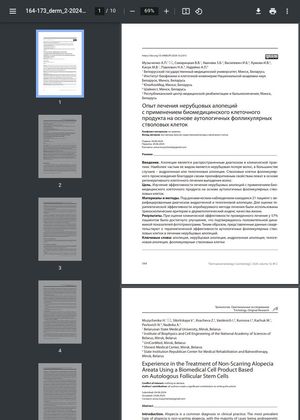Experience in the Treatment of Non-Scarring Alopecia Areata Using a Biomedical Cell Product Based on Autologous Follicular Stem Cells
June 2024
in “
Дерматовенерология Косметология
”

TLDR Autologous follicular stem cells improved hair loss in 57% of patients.
This study evaluated the effectiveness of a treatment for non-scarring alopecia using a biomedical cell product based on autologous follicular stem cells. It involved 21 patients diagnosed with androgenic alopecia and telogen effluvium. The treatment's efficacy was assessed using trichoscopic criteria and the dermatological quality of life index. Results showed that 57% of patients experienced improvement, as confirmed by phototrichograms, indicating the therapeutic potential of autologous follicular stem cells in treating non-scarring alopecia.

